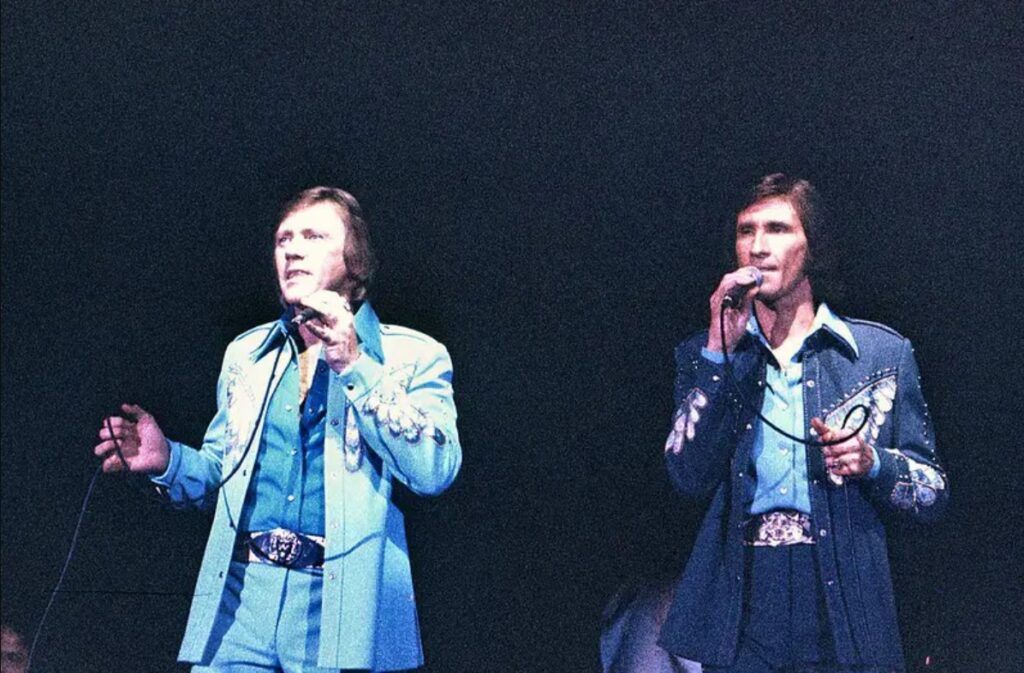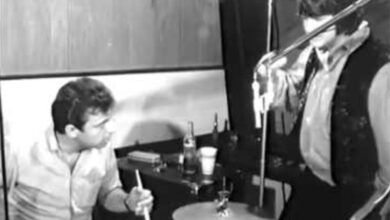This track was recorded in 1955, yet it stands as one of the most iconic songs of all time.
The 2002 Musikschau der Nationen in Bremen, Germany, brought together a powerful and emotional performance by an international ensemble of military orchestras. This festival, which had been a celebration of military music for decades, became the stage for a breathtaking rendition of “Unchained Melody” during its grand finale. The event featured over 800 musicians from 11 nations, including countries like the U.S., Russia, and Mexico, uniting for a stunning tribute to peace and cooperation through music.

“Unchained Melody,” originally written for the 1955 film Unchained, took on new life as this collective orchestra transformed the iconic ballad into a sweeping instrumental arrangement. Known for its hauntingly beautiful melody, the song’s themes of longing and emotional connection resonated deeply during this performance, amplified by the sheer number of musicians involved. The orchestras, dressed in their formal military attire, conveyed both unity and grandeur, making the music soar within Bremen’s Stadthalle.
The Musikschau der Nationen is one of the largest gatherings of military musicians in Europe, blending classical, jazz, and traditional marching music. However, the performance of “Unchained Melody” stood out as a testament to the universal language of music. The song’s melancholic yet hopeful tone struck a chord with both the audience and the performers, symbolizing a yearning for peace and harmony in a time marked by global tensions.
As the song was played, it seemed to transcend its original context from the film Unchained, becoming an anthem of connection across borders. The musicians, representing diverse backgrounds, created a moment of musical collaboration that celebrated unity rather than conflict. This rendition of “Unchained Melody” was not just a performance—it was a powerful reminder of how music can bring people together, even in times of uncertainty.
“Unchained Melody” has long been a favorite for covers and orchestral renditions, but its significance during this festival cannot be understated. The song has been recorded by many artists over the years, including The Righteous Brothers, whose 1965 version became one of the most beloved. The instrumental arrangement at the Musikschau der Nationen built upon the song’s legacy, adding another layer of emotional depth to its already rich history.
In addition to the powerful orchestration, the spectacle of hundreds of musicians playing in perfect harmony highlighted the precision and discipline required for such a massive collaboration. The performance not only honored the legacy of “Unchained Melody” but also showcased the unique skills of military musicians, who often perform in less publicized settings. The event served as a reminder of their artistic talents, beyond their military roles.
The song’s enduring appeal lies in its ability to convey deep emotion, and this performance exemplified that beautifully. The Musikschau der Nationen proved to be the perfect setting for this iconic piece, as it blended tradition with the universal human desire for connection. The orchestras, with their varied national identities, embodied the spirit of global cooperation, making their rendition of “Unchained Melody” a truly unforgettable experience.
Elvis Presley’s Rendition of “Unchained Melody”
“Unchained Melody” is one of the most enduring and beloved songs of the 20th century, known for its heartfelt lyrics and haunting melody. Originally composed by Alex North with lyrics by Hy Zaret in 1955 for the film “Unchained,” the song has been covered by numerous artists across various genres. Among these renditions, Elvis Presley’s version stands out, adding his unique vocal style and emotional depth to the classic tune. Although not the most commercially successful version, Elvis’s interpretation has garnered appreciation for its sincerity and vocal prowess.
Elvis Presley had a profound appreciation for ballads and love songs, often incorporating them into his live performances and studio recordings. “Unchained Melody” resonated with him due to its poignant expression of longing and love, themes that frequently appeared in his music. Presley’s connection to the song was evident in the passionate delivery he brought to his rendition, reflecting his ability to convey deep emotion through his singing.
Elvis Presley recorded his version of “Unchained Melody” during the sessions for his 1961 album “Blue Hawaii.” The recording took place at Radio Recorders in Hollywood, a studio renowned for its state-of-the-art equipment and acoustics. Elvis worked with his longtime collaborator, producer Steve Sholes, who encouraged him to explore the softer, more melodic side of his vocal range. The arrangement featured lush orchestration, complementing Elvis’s vocal lines and enhancing the song’s romantic ambiance.
Elvis’s rendition of “Unchained Melody” maintains the song’s classic structure but infuses it with his signature style. The arrangement includes a blend of strings, piano, and subtle percussion, creating a rich, layered sound that supports his expressive vocals. Elvis employs his trademark vibrato and dynamic control, navigating the song’s crescendos and softer passages with ease. The overall feel is both intimate and grandiose, allowing the emotional weight of the lyrics to shine through.
While Elvis did not release “Unchained Melody” as a standalone single, his version was included in his album “Blue Hawaii,” which was released in 1961. The album itself was a commercial success, capitalizing on the popularity of the film of the same name. “Unchained Melody” contributed to the album’s appeal, showcasing Elvis’s versatility as an artist capable of delivering powerful ballads alongside his more upbeat rock and roll tracks.
Upon its release, Elvis’s “Unchained Melody” received positive reviews from both critics and fans. Critics praised his ability to convey deep emotion through his performance, highlighting the sincerity and vulnerability in his vocals. While not achieving the same iconic status as The Righteous Brothers’ later version, Elvis’s rendition was appreciated for its heartfelt interpretation and the artist’s vocal excellence. Fans enjoyed the song as part of the broader “Blue Hawaii” album, which was celebrated for its cohesive romantic theme.
“Unchained Melody” has been covered by numerous artists, each bringing their unique style to the song. The most famous rendition is by The Righteous Brothers, released in 1965, which became a massive hit and remains a staple in popular culture. Compared to The Righteous Brothers’ version, Elvis’s rendition is more understated and orchestral, emphasizing his smooth vocal delivery over the more soulful and robust arrangement of The Righteous Brothers. This contrast highlights Elvis’s ability to adapt the song to his own musical sensibilities.
While “Unchained Melody” was not a standout hit in Elvis Presley’s discography, it played a role in showcasing his versatility as an artist. During the early 1960s, Elvis was expanding his repertoire beyond rock and roll, delving into pop standards and ballads. “Unchained Melody” exemplified this shift, allowing him to reach a broader audience and solidify his status as a versatile and enduring performer. The song remains a testament to his ability to interpret and breathe new life into classic material.
Decades after its initial release, Elvis Presley’s version of “Unchained Melody” continues to be appreciated by fans and music enthusiasts. It is often highlighted in collections of his greatest ballads and remains a favorite in his live performance recordings. The song’s timeless quality, combined with Elvis’s emotive delivery, ensures that his version remains relevant and cherished alongside other iconic interpretations. It also serves as a bridge connecting Elvis’s legacy with the broader history of this classic song.
Elvis Presley’s rendition of “Unchained Melody” is a significant piece in the artist’s extensive catalog, demonstrating his ability to convey profound emotion through song. While it may not have achieved the same level of fame as some of his other hits, it remains a beloved interpretation that showcases his vocal talent and emotional depth. “Unchained Melody” continues to resonate with listeners, highlighting the enduring appeal of both Elvis Presley as an artist and the timeless quality of the song itself. This collaboration between Presley’s artistry and the classic composition ensures that “Unchained Melody” remains an important part of music history.





